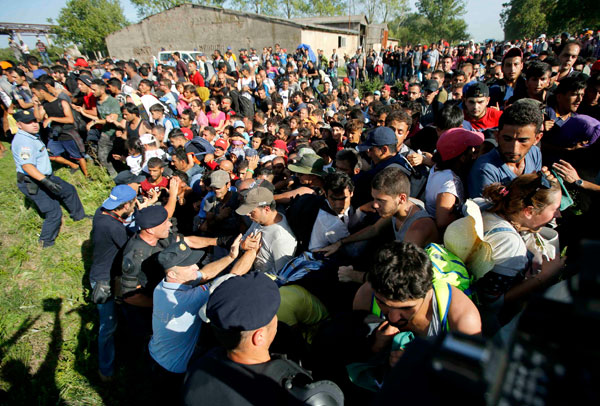EU's Tusk calls EU summit on migration
(Agencies) Updated: 2015-09-18 00:09
 |
|
Migrants push policemen during a stampede to board buses in Tovarnik, Croatia September 17, 2015. Croatia said on Thursday it could not take in any more migrants, amid chaotic scenes of riot police trying to control thousands who have streamed into the European Union country from Serbia.[Photo/Agencies] |
BRUSSELS - European Council President Donald Tusk has summoned EU leaders to an extraordinary summit next Wednesday to tackle the migration crisis.
It will be held a day after interior ministers make their second attempt in little more than a week to break a deadlock on proposals by the EU executive to redistribute 120,000 asylum-seekers around the 28-nation bloc.
Tusk and the leaders are hoping that problem will resolved by the time they meet in Brussels at 6 p.m. (1600 GMT) on Sept. 23 so that the summit can focus on other pressing elements required to bring migration flows under control.
German Chancellor Angela Merkel, who had urged Tusk to call a summit, has said it should concentrate on support for Turkey, through which many of the migrants are passing, as well as other states in the region that are housing Syrian refugees. And it should discuss improving the management of external EU borders.
Eastern European states that have led opposition to calls for mandatory quotas for taking in refugees are pressing for more action to halt the influx of people across especially the Greek and Italian borders who do not qualify for refugee status.
And Tusk, who visited Turkey last week and plans to be in Jordan on Sunday, also wants a discussion on how the EU can support countries bordering Syria that are housing millions of refugees from its civil war.
EU interior ministers are due to revisit the mandatory relocation plan at an emergency meeting on Tuesday after the European Parliament endorsed it on Thursday, with diplomats keen to avoid a new failure to act.
Hungary, Slovakia, the Czech Republic, Romania and Poland, all former communist countries that joined the EU a decade ago, are the main opponents of compulsory quotas, arguing that they would draw more migrants to Europe and disrupt their societies, which are not accustomed to large-scale immigration.
Hungary rejected the scheme even though it, along with Greece and Italy, would be sending asylum seekers to other European states rather than taking them in. Budapest argues that most of the migrants arriving on its border first entered the EU in Greece, hence it should not be treated as a frontline state.
Germany and France, the main recipients of relocated asylum seekers, may resist a voluntary system because they would likely end up with more refugees than under mandatory quotas.






